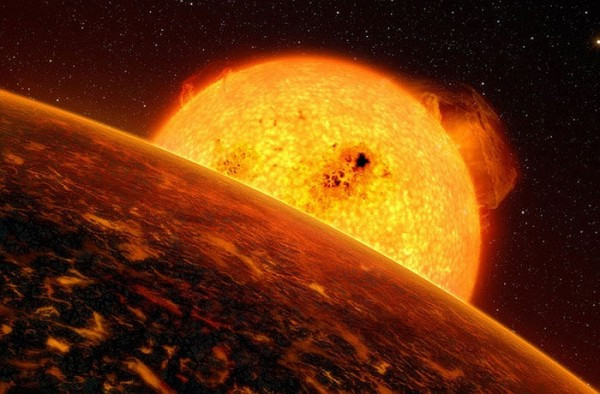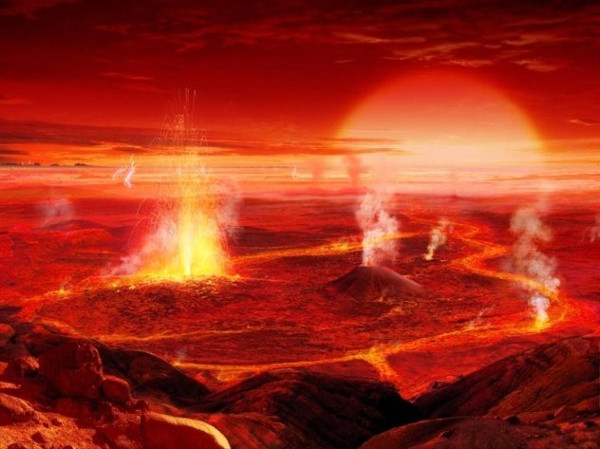Volcanic hell in the universe
CoRoT-7b, an extrasolar planet, is a world covered by lava ocean, has a scarred surface due to the intense eruption of volcanoes and the atmosphere formed from evaporated rock.
CoRoT-7b - The planet is covered by ocean of lava
CoRoT-7b is named after the telescope of the French Space Agency, where it was discovered. This rocky planet orbits a star about 480 light years from Earth, in the constellation Monoceros. It is 5 times heavier and twice as big as the Earth. However, CoRoT-7b is more than 60 times closer to the parent star than Earth.

CoRot-7b is an extrasolar planet near the parent star.(Photo: Wikimedia Commons).
Due to the tide lock phenomenon , one side of CoRoT-7b always faces the mother star, while the other side turns to the opposite side. The planet's dark side has a low temperature of -210 ° C. In contrast, the illuminated face has a temperature of up to 2,200 ° C, hot enough to evaporate all rocks. This means that any hard material on this side will instantly change from solid to gaseous form.
The planet's atmosphere also creates rain like Earth but in a different way. Instead of condensed water falling to the ground, CoRoT-7b's atmosphere is made of evaporated rock, sometimes condensing and falling from the sky like gravel.
When Brian Jackson and his colleagues at the US Space Agency's Goddard Space Research Center (NASA) modeled the atmosphere on CoRoT-7b, they found that it had no common gas in planets. rock. Research on the weight loss of the planet through heating mechanism shows that, when newly formed, CoRoT-7b is 100 times heavier than Earth and revolves around its mother star 50 times longer than it does. now on.

Ocean lava on CoRoT-7b surface.(Photo: API).
According to scientists, CoRoT-7b may be the remnant from the core of a giant gas planet . Recent planetary models indicate that giant gas planets in other star systems tend to be swept towards the star mother after forming and start to evaporate violently, leading to hydrogen and helium in the atmosphere. lost in the universe.
Even when CoRoT-7b was born as a rocky planet, most of its weight was lost due to the extremely high temperature in the face facing its star."In any case, the planet is disappearing right in front of our eyes. CoRoT-7b may be the first planet in a new category - the remnant core evaporates, " Jackson said.
The history of CoRoT-7b is not the most special point. Two nearby planets interfered with the orbit of CoRoT-7b, ripping off its inner part and producing huge amounts of heat in the form of volcanic eruptions. The eruption activity is not only strong on the bright side but also appears on the dark side of the planet. When spraying into cold air, molten lava cools quickly and falls in the form of snow.
- Visit hell 'frightened' of ancient people
- Guatemala: The door of hell appears in the middle of the house
- 9 Hell Floor in Dan Te's Spirit Song
- Believing in hell makes us less happy
- Visit the real
- Highway from hell
- New video filmed the fearsome 'hell gate' for 50 years
- 'Hell's Gate' in Ethiopia is filled with 7km long cracks
- He was afraid of the sky burning like hell because of the Hawaii volcano
- China appears 'hell gate'
- 6 most terrifying landmarks in the world
- 10 'hell' planets for humans
 Van Allen's belt and evidence that the Apollo 11 mission to the Moon was myth
Van Allen's belt and evidence that the Apollo 11 mission to the Moon was myth The levels of civilization in the universe (Kardashev scale)
The levels of civilization in the universe (Kardashev scale) Today Mars, the sun and the Earth are aligned
Today Mars, the sun and the Earth are aligned The Amazon owner announced a secret plan to build a space base for thousands of people
The Amazon owner announced a secret plan to build a space base for thousands of people